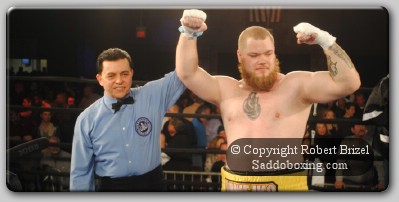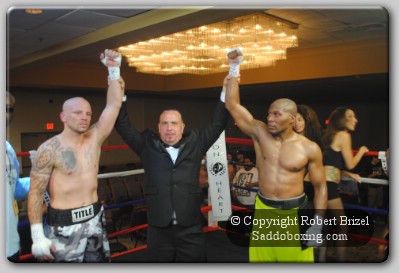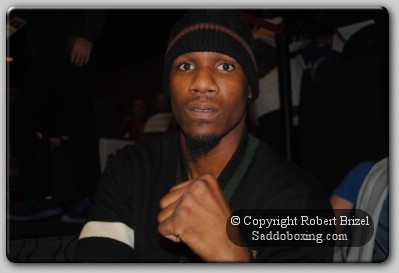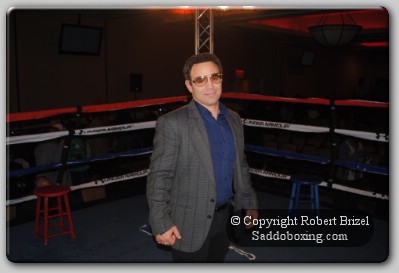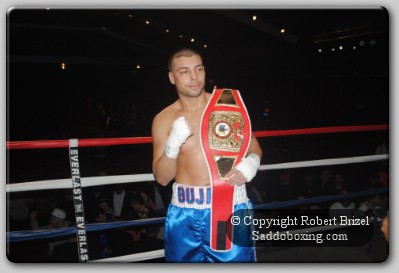Recently, I spoke with former World Light-Heavyweight Champion John Conteh. As an amateur, Conteh was a Middleweight and Light-Heavyweight National Champion. As a pro, he won the vacant Light-Heavyweight title against Argentinaʼs Jorge Ahumada in 1974.
After three defenses, he was stripped of that title for failing to defend against Miguel Cuello. Conteh would fail in future title opportunities to Mate Parlov and twice against Matthew Saad Muhammad. He is considered one of Britainʼs most successful boxers. He retired in 1980 with a record of 34-4-1.
Shawn Murphy: At what age did you first start boxing?
John Conteh: I started around eleven years of age. My dad was teaching me boxing. He wasnʼt a boxer but he taught me. I had a good amateur career, won a few amateur titles. I really committed myself around eighteen years of age. I had probably fifty or so amateur fights.
SM: Do you remember anything special about your first pro fight?
JC: Yeah, it was in Liverpool. I knocked out Okacha Boubekeur in one round. George Francis was my manager and Jack Sullivan was my promoter. I had about three fights with Jack and then signed with a bigger syndicate.
SM: After you beat Terry Daniels in 1973, you were considered a heavyweight prospect. Any serious thoughts about fighting as a straight up heavyweight at that time?
JC: I just left that in the hands of my manager. They were picking heavyweight fights for me, but I really didnʼt think I was that big. I was about 13 stones at the time, just a 1/2 stone over the light-heavyweight limit.
There was no cruiserweight division at that time you know. So I really didnʼt think I could fight at heavyweight, especially with the likes of Ali around. I fought on one of Aliʼs undercards in Las Vegas, and Ali told me I should drop down to light-heavyweight. I think he was scared of me. (laughing)
SM: You beat Chris Finnegan in a much anticipated fight in 1973. What do you remember most about that fight?
JC: I fought a guy named Rudy Schmidtke a few months before that and won the European title. Chris had the British and Commonwealth title. We fought for the “Triple Crown”. It went fifteen rounds, that was a hard fight. I defended that title against him the following year, beat him in six.
SM: Your first world title shot was against Jorge Ahumada for the vacant WBA title. Was the title vacant because Foster refused to fight you or Ahumada?
JC: I really donʼt know. Foster was a great fighter. I know Ahumada and Bob fought in 1974 and it was declared a draw. They fought in Bobʼs hometown of Albuquerque. So somewhere in between Bob retired or something and thatʼs when me and Jorge fought.
SM: How close was that fight?
JC: It was a hard fight. I won a unanimous decision. He was very strong, a very busy fighter. That was in Wembley, with all my fans there. I think that
was the highlight of my career, definitely.
SM: After you won the title, you would defend it just three times in the next three years. What was going on during this period?
JC: I was having a lot of problems with my management, TV rights and stuff. Once the cracks started showing it was very difficult to get them back together. It was a tough three years. I broke my hand in Scranton, Pennsylvania in the third round against Willie Taylor during this time. I didnʼt feel that my hands were being tied right now. I had left my management and my trainer George Francis was no longer there as well. I was with Don King. I still won that fight though.
SM: Just two days before a scheduled defense against Miguel Cuello you backed out and were stripped of the title, why?
JC: It was all about the money, the contracts and TV rights. My mind wasnʼt together after my split with management and I just couldnʼt focus. But it was all about contracts and TV rights.
SM: You were given a shot to reclaim that title in 1978 against Mate Parlov. The decision was close; did you think you won that fight?
JC: Yes, I thought I won that fight but I knew I wouldnʼt get a decision over there in front of his home crowd. No reflection on Mate, just the judges. It was a close fight but I was in his backyard, Belgrade.
SM:You would fight for the title twice more, against Matthew Saad Muhammad in 1979 and 1980. What do you remember most about those fights and Saad Muhammad?
JC: Well, he was a great fighter. The first fight I was back together with my trainer, George Francis. I was really fit and strong and went fifteen rounds. I got a return bout because they were using illegal substances to repair the eye damage. In the return bout I was stopped in four rounds.
SM: Your final fight was against James Dixon in 1980. It was reported that after that fight you failed a brain scan and your license was revoked. Is that what happened?
JC: That was in Liverpool, I thought I would go out on a winning note. They found a slight stain on the stem of the brain. When I was making a comeback about a year later I had another one and it came back OK. But it just wasnʼt right at that time for me to stay in the ring and keep fighting. I just made a decision at that time to quit. A comeback never materialized. I was tempted but never did, my heart just wasnʼt in it.
SM: Any regrets about your boxing career looking back now?
JC: No, not really. Sure, I have made some mistakes. Would I have done some things a little different? Yes of course. I look back now and say that wasnʼt what I should have done, but at the time I thought things were right.
SM: Are there any fighters you would of liked to have fought but didnʼt?
JC: Not really, I just wanted to keep busy. As you’re fighting, you’re learning. You’re just in there fighting, doing your trade, doing your business, keeping it simple. When you win the title, it gets complicated. If I had to do it again I would just stay as busy as I could, fight all the tough guys around. I know Carlos Monzon was mentioned and Bob Foster too.
To make it negative, I guess I never won the title from the champion, it was a vacant title. I never rode off in the sunset, it didnʼt happen that way for me. It doesnʼt happen that way for a lot of people. You do the best you can, thatʼs just the way it was. But I always had different fights, different challenges in my head.
SM: So, after retirement from the ring, what did you do?
JC: I ran into alcoholism. But then I overcame that. I then got into after-dinner speaking, which is on the Sport and Dinner circuit. Itʼs kind of like a pension plan for us you know. Iʼve been doing that for the last nineteen years. Iʼm involved a lot with charities as well, mostly related to golf. My son is a professional golfer.
SM: This might be a little off subject but how did you ever get on the cover of Paul McCartneyʼs “Band On The Run” album?
JC: Heʼs from Liverpool and so was I. At the time everything was going right for me. I was pretty high profile wining the title and everything. Paul had the idea of getting these different people on the cover, prisoners escaping. With his kind of money I suppose you could arrange whoever you wanted to. (laughing)
SM: Whatʼs your view of the state of boxing today?
JC: I donʼt follow it closely Shawn. I donʼt want to bore you, I just donʼt follow it that close, I just watch it generally. Iʼve never been into the business side of it. Itʼs got more complicated because of all the weight divisions. Thatʼs good for the fighters though. I think itʼs safer now.
But all the different weight divisions makes it difficult for the fans I think. Guys donʼt want to fight each other because their manager doesnʼt want them to risk anything. They just want to hold onto the belt to make money. If that happens it becomes very frustrating. When you have a guy like Mike Tyson on the scene you know heʼs the man and you have to fight and beat him.
So they need to do something about the best fighters not fighting each other. That seems to be counterproductive to boxing. I still think itʼs a great sport for the young man who has the ability and can get paid for doing it. There are a lot more dangerous sports out there.
SM: Finally, Mr. Conteh, are there any final words you have for the fans?
JC: IʼLL BE BACK! (laughing) I think that has already been said though hasnʼt it? I just wish all the fans and all the people in boxing out there all the best.
 Boxing News Boxing News
Boxing News Boxing News
